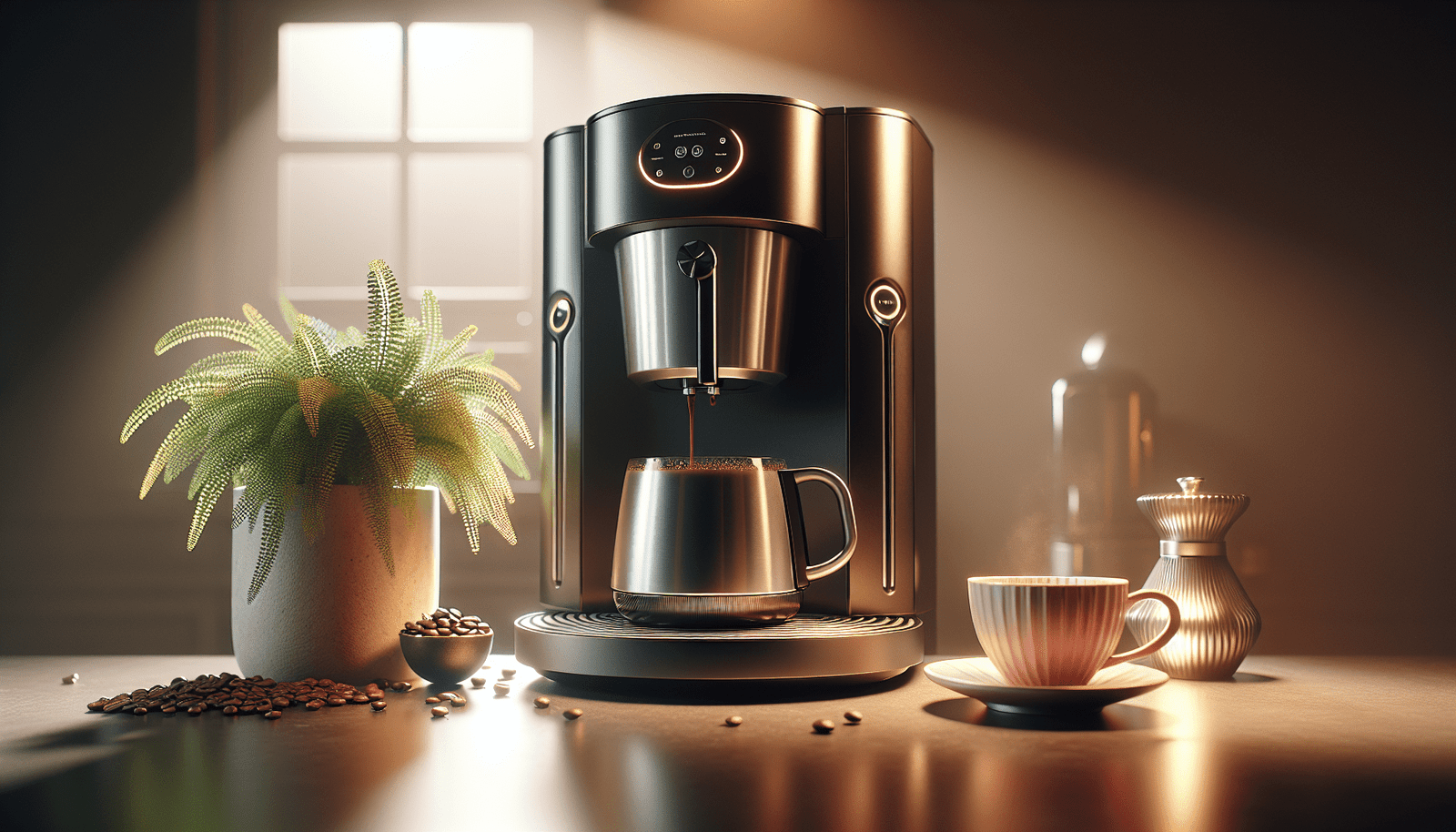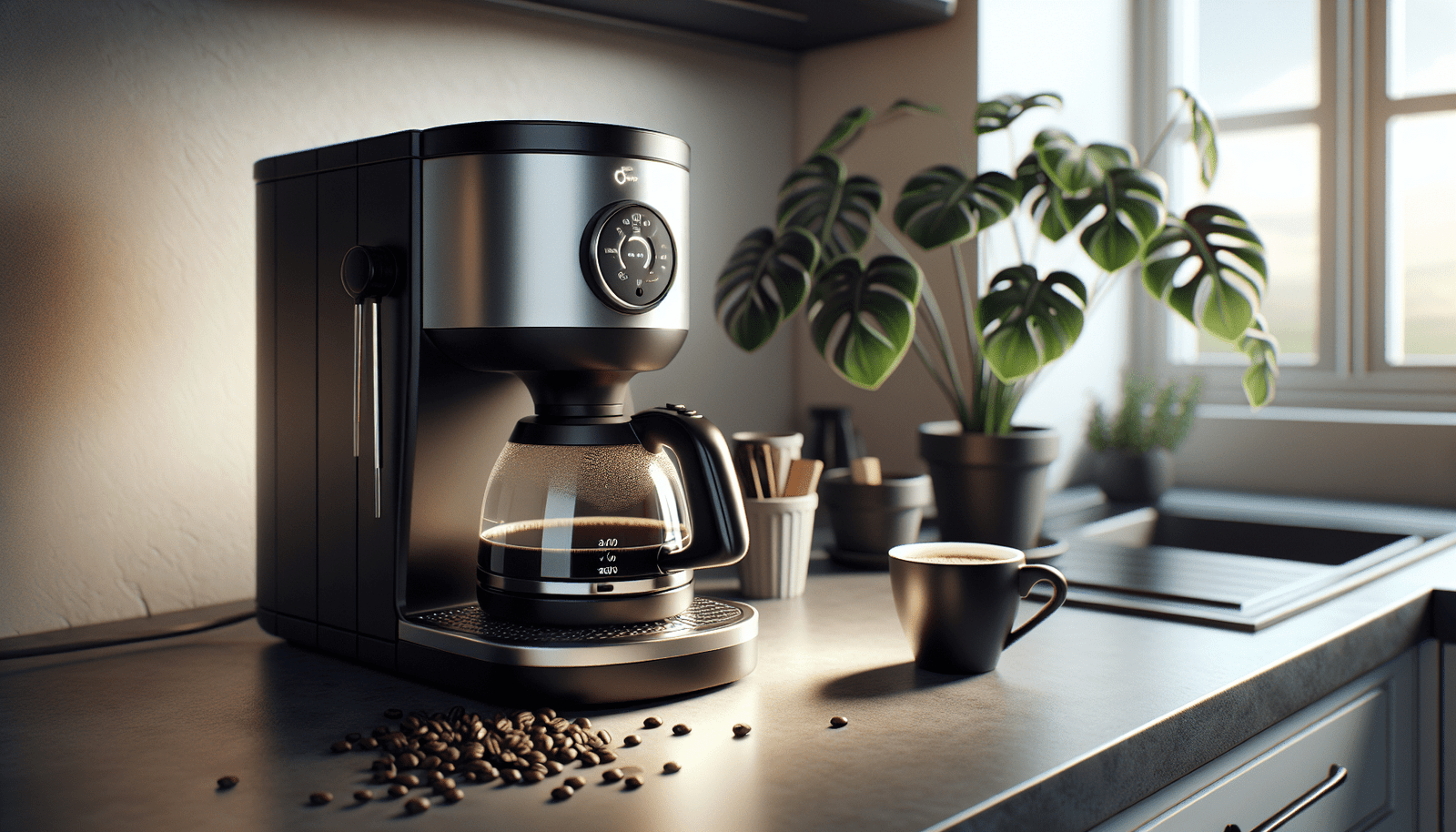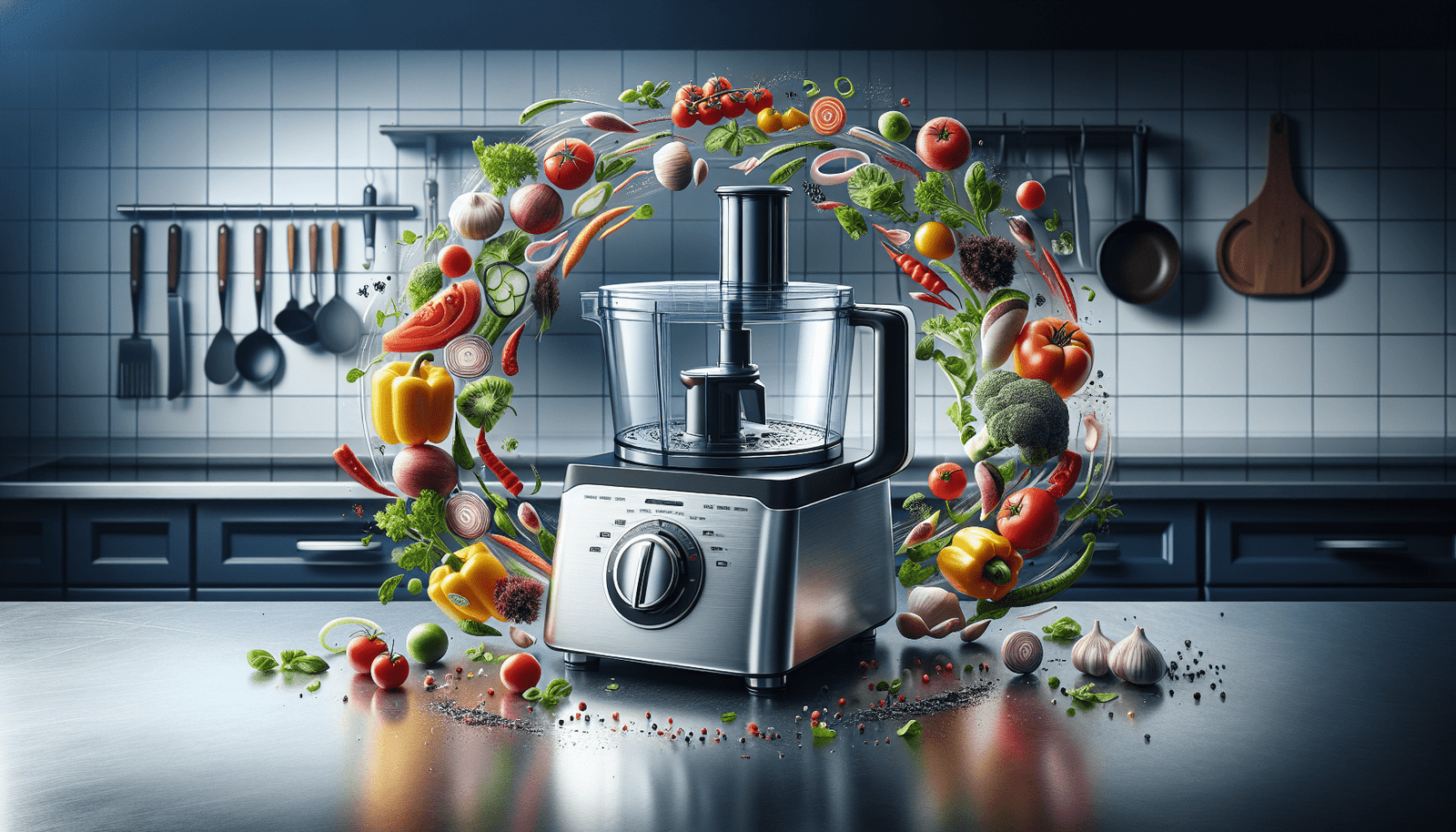Imagine waking up to the delightful aroma of freshly brewed coffee, a ritual that marks the beginning of a new day for many. In “The Ultimate Guide to Coffee Makers,” you’re about to embark on a fascinating journey through the world of coffee machines, from the simplest drip brewers to sophisticated espresso makers and everything in between. Whether you’re a casual coffee drinker looking to upgrade your morning routine or a discerning aficionado eager to refine your barista skills at home, this guide is meticulously crafted to help you navigate the myriad of options available. With insights into the latest technology, user-friendly comparisons, and tips on selecting the perfect machine to match your lifestyle and taste, your path to achieving cafe-quality coffee at home starts here. Join us at Cooking Appliance World, your trusted partner in turning everyday cooking into an extraordinary experience, and let’s discover together how the right coffee maker can transform your kitchen into a sanctuary of flavor and aroma.
Types of Coffee Makers
Coffee makers come in an array of types, each with its own set of features and benefits that cater to different coffee brewing preferences. Whether you’re a fan of rich espresso or a smooth cold brew, there’s a coffee maker out there for you.
Single Serve Coffee Makers
Single serve coffee makers are the go-to option for those who value convenience and speed above all else. Perfect for busy mornings, these machines allow you to brew a fresh cup of coffee at the press of a button, often using pods or capsules.
Drip Coffee Makers
Drip coffee makers are the classic choice for brewing coffee. They work by dripping hot water over ground coffee, which then flows into a carafe or pot. These machines are ideal for households or offices where multiple cups of coffee are consumed throughout the day.
Espresso Machines
For the coffee aficionados who appreciate a strong, concentrated cup, espresso machines are the ultimate choice. These machines use high pressure to force water through finely-ground coffee, resulting in espresso shots that can be enjoyed on their own or used as a base for lattes and cappuccinos.
French Press
The French press offers a more hands-on approach to brewing coffee, allowing you to control the strength and flavor of your brew. Coffee grounds are steeped in boiling water and then separated using a manual press. This method is cherished for its ability to highlight the coffee’s true flavor profile.
Cold Brew Coffee Makers
Cold brew coffee makers are designed for those who enjoy a smoother, milder coffee taste. Coffee grounds are steeped in cold water for an extended period, usually 12-24 hours, to produce a concentrated coffee that can be served cold or hot.
Percolators
Percolators brew coffee by continuously cycling boiling water through coffee grounds until the desired strength is reached. This method is great for producing strong and bold flavors and is often used in outdoor settings or when simplicity is preferred.
Aeropress
The Aeropress is a newer addition to the coffee maker family, offering a fast and versatile brewing method that combines the best elements of espresso machines and French presses. It’s beloved for its ability to produce a rich and smooth cup of coffee in under a minute.
Siphon Coffee Makers
Siphon coffee makers, also known as vacuum pots, provide a theatrical brewing experience. Heat forces water upwards into a chamber with coffee grounds, then coffee is pulled back down by gravity and vacuum pressure. This intricate method is known for producing exceptionally clean and flavorful coffee.
Buying Guide: What to Look for in a Coffee Maker
When investing in a coffee maker, there are several factors you should consider to ensure you choose the right machine for your coffee brewing needs.
Capacity and size
Consider how much coffee you drink and the space you have available. Single serve coffee makers are compact, while larger drip or espresso machines may require more countertop space.
Brewing temperature
The brewing temperature can significantly affect the taste of your coffee. Most experts recommend a temperature between 195°F to 205°F for optimal flavor extraction.
Speed
If you’re always in a rush, look for a coffee maker that brews quickly. Single serve machines and Aeropresses are known for their speedy brewing times.
Ease of use
Choose a coffee maker with an intuitive design and easy-to-navigate controls. Machines with too many settings can be overwhelming for some users.
Cleaning and maintenance
Look for coffee makers that are easy to clean and maintain. Removable parts and self-cleaning features can save a lot of time and effort.
Additional features
Consider coffee makers with useful features such as timers, auto-shutoff, or built-in grinders. These can enhance your coffee brewing experience.
Durability and warranty
Opt for coffee makers from reputable brands that offer solid warranties. This can give you peace of mind knowing that your investment is protected.
Price range
There’s a wide range of prices for coffee makers. Determine your budget and consider which features are most important to you to find the best value.

The Best Coffee Makers for Different Needs
Best for busy mornings
Single serve coffee makers, with their one-touch operation and rapid brewing time, are perfect for those who need their coffee fix quickly in the morning.
Best for flavor aficionados
French press or siphon coffee makers are ideal for those who enjoy the nuanced flavors of coffee. These methods allow for greater control over the brewing process and extraction, resulting in a more flavorful cup.
Best for budget-conscious
Drip coffee makers are a great option for those on a budget. They are typically less expensive than other types and can brew multiple cups of coffee at once, making them economical for daily use.
Best for small kitchens
For those with limited space, a compact single serve coffee maker or Aeropress can be a great choice as they take up minimal counter space.
Best for office use
A large-capacity drip coffee maker or an espresso machine with a built-in grinder can cater to the varied coffee preferences of office employees while being convenient to use and maintain.
Best for tech-savvy users
Smart coffee makers with programmable settings, app integration, and temperature control features are perfect for tech enthusiasts who love to have control over every aspect of their coffee brewing.
How to Use Different Coffee Makers
Single Serve Quick Guide
- Fill the reservoir with water.
- Insert the coffee pod or capsule.
- Press the brew button and wait for your coffee to be ready.
Mastering the Drip Coffee Maker
- Add water to the reservoir.
- Place a coffee filter in the basket and add ground coffee.
- Turn on the machine and wait for the brewing process to complete.
Espresso Machine Basics
- Fill the portafilter with finely ground coffee.
- Tamp the grounds evenly.
- Attach the portafilter to the machine and start the brew cycle.
Brewing the Perfect French Press
- Add coarse ground coffee to the French press.
- Pour hot water over the grounds and stir.
- Place the lid on and let it brew for 4 minutes before pressing down the plunger.
Making Cold Brew at Home
- Combine coarse ground coffee with cold water in a jar.
- Let it steep in the refrigerator for 12-24 hours.
- Strain the coffee and enjoy it cold or heated.
Percolator Best Practices
- Fill the bottom chamber with water and the filter basket with ground coffee.
- Heat the percolator until it starts to brew.
- Once brewing is complete, remove from heat and serve.
The Art of Aeropress
- Insert a filter in the cap and attach it to the chamber.
- Add coffee and hot water, then stir.
- Insert the plunger and press down firmly.
Siphon Coffee Maker Tutorial
- Fill the bottom chamber with water and place it on the heat source.
- Add coffee to the upper chamber once water rises.
- Stir and let it brew before removing from heat. The coffee will draw back down into the lower chamber, ready to serve.

Maintaining Your Coffee Maker
Daily and weekly cleaning
Clean removable parts with soap and water after each use. Wipe down the machine’s exterior regularly to keep it looking new.
Deep cleaning methods
Use a specific coffee maker cleaner or a mixture of water and vinegar to run a brewing cycle without coffee. This will help remove any built-up residue.
Replacing filters and parts
Regularly check and replace filters or worn-out parts to ensure your coffee maker continues to function efficiently.
Decalcifying your coffee maker
Hard water can cause mineral buildup in your machine. Decalcify it every few months with a descaling solution or a vinegar-water mixture to keep it running smoothly.
Storage tips
Store your coffee maker in a dry, cool place when not in use. If it’s a model that you don’t use daily, ensure it’s clean and dry before storing.
The Science of Coffee Brewing
Understanding extraction
Extraction is the process of pulling the flavors and oils from coffee grounds. The right balance is key to a perfect brew—too little and your coffee will taste weak, too much and it becomes bitter.
The importance of water temperature
Water temperature affects extraction speed and efficiency. Too hot and it may over-extract, too cold and under-extraction is likely. Aim for that 195°F to 205°F sweet spot.
Grind size and its effects on flavor
The grind size of your coffee should match your brewing method. Fine grinds are best for espresso, medium for drip, and coarse for French press. Incorrect grind sizes can significantly affect the taste.
Brewing time and strength
The longer coffee grounds are in contact with water, the stronger the brew. Adjust brewing times based on your taste preference and the coffee maker you’re using.
The role of coffee freshness
Fresh coffee beans make a significant difference in flavor. Store your beans in an air-tight container and grind them just before brewing for the freshest taste.
Accessories for Coffee Makers
Coffee grinders
A quality grinder is essential for brewing the best coffee. Burr grinders provide a consistent grind size compared to blade grinders.
Filters – Paper vs. Metal
Paper filters produce a cleaner cup with less sediment, while metal filters allow more oils to pass through, resulting in a fuller-bodied taste.
Thermal carafes vs. Glass carafes
Thermal carafes keep coffee hot without the need for a heating plate, which can alter the coffee’s taste over time. Glass carafes are more affordable and let you see how much coffee is left.
Measuring tools
Accurate measuring tools, such as scoops or scales, ensure you use the right amount of coffee for your desired strength.
Cleaning supplies
Special coffee maker cleaners, descaling solutions, and brushes can help maintain and extend the life of your coffee maker.
Milk frothers
A milk frother is a great accessory for making lattes, cappuccinos, and other espresso-based drinks at home.
Coffee scales
A coffee scale ensures you use the exact amount of coffee and water every time, leading to more consistent brewing results.
Coffee Maker Innovations and Technology
Smart coffee makers and apps
Smart coffee makers can be controlled via smartphone apps, allowing you to schedule brewing times, adjust strength settings, and keep track of maintenance needs.
Temperature control features
Advanced coffee makers offer precise temperature controls for a more consistent and perfect brew every time.
Programmable settings
Some coffee makers allow you to save your preferred brewing settings, making it easy to recreate your favorite cup of coffee with the press of a button.
Automation
Automatic grinding, dosing, and tamping features in espresso machines make it easier to brew a perfect espresso with minimal effort.
Sustainability and eco-friendly designs
Eco-friendly coffee makers are designed to reduce waste and energy use. Reusable filters, biodegradable pods, and energy-saving modes are common features.
Multi-use appliances
Some coffee makers come with additional features, such as hot water dispensers for tea or built-in milk frothers, adding versatility to your kitchen appliances.
Troubleshooting Common Coffee Maker Problems
Not brewing properly
Check for clogs in the system and ensure all parts are correctly assembled. Descale your machine if you have hard water.
Leaking issues
Ensure all parts are securely fitted. Replace any worn-out gaskets or seals.
Coffee tastes bad
Use fresh, correctly ground coffee, and ensure your coffee maker is clean. Also, consider the quality of your water.
Machine making noise
This can be normal for some machines, especially during heating cycles. If it’s excessive, check for obstructions or limescale buildup.
Power problems
Ensure the coffee maker is plugged in and the outlet is working. Check the machine’s fuse and replace it if necessary.
Solving grinder issues in integrated devices
Clean the grinder regularly to prevent clogs. If it’s not grinding properly, check for dull blades or burrs and replace them.
Where to Buy the Best Coffee Makers
Online retailers vs. physical stores
Online retailers often offer a wider selection and better prices, but physical stores allow you to see and sometimes test the products before buying.
Considering refurbished units
Refurbished coffee makers can be a great deal, providing high-quality machines at a lower price. Ensure they come with a warranty.
Warranty and customer service
Look for products with solid warranties and good customer service for a more secure investment.
Exclusive deals and promotions
Keep an eye on sales and promotions, both online and in stores, to get the best deal on your coffee maker.
How to find unbiased reviews
Read reviews from multiple sources and focus on those that discuss long-term use to get a comprehensive view of the product’s performance and reliability.
Embracing the world of coffee makers can transform your daily routine, offering a customized cup of coffee that perfectly suits your taste and lifestyle. Whether you’re a casual coffee drinker or a connoisseur, understanding the nuances of different machines and brewing methods can significantly enhance your coffee experience.


